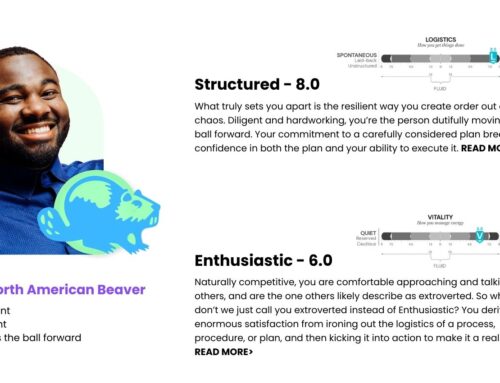Leaders for a Hybrid Work World
The new world of both remote and in-office work appears to be here to stay, and will require a new hybrid leadership mindset to go with it – one predicated on a healthy dose of self-awareness and the soft skills that come with it.
Or so say a variety of leadership and talent management experts, who point out that today’s in-demand workers expect to work for organizations that prioritize self-awareness and the traits that come with it – e.g., emotional intelligence, transparent communications, open-mindedness, humility, sublimated ego, trust, etc.
“The pandemic forced millions of people to unexpectedly and simultaneously reflect on the role of work in their individual lives,” says Beatrice Kahl, Chief People Officer at Xayn. “The conclusions they came to in overwhelming numbers – not only that work isn’t everything, but that work was swallowing their other priorities. This level of radical self-awareness is something HR pros must keep at the forefront of their thinking if they’re going to find and retain great employees and foster healthy workplaces.”
A Wakeup Call to Leaders
Unfortunately, too few leaders and HR executives have fully connected the dots between the importance of self-awareness and the emotional intelligence that comes with it.
Today’s leaders are more interested in “conflict management and communication. Yet they put the need for compassion, relationship and persuasion skills far down on their list,” writes Douglas LaBier, PhD. “They think of the latter as ‘soft skills,’ ancillary at best.”
The challenge with these outdated mindsets: it similarly allows outdated leadership woes to fester and grow. For example, research shows that both longevity in a leadership role, as well as power itself, ultimately produce leaders who are increasingly egoic and out of touch with their employees. These, in turn, lead to the very same toxic work environments that have contributed to the Great Resignation, Quiet Quitting, and a host of other organizational challenges.
But as LaBier points out, this rigid, outdated mindset “reflect the failure of coaching programs to show that the infrastructure of successful leadership vision and behavior is heightened self-awareness about one’s motives, values, and personality traits. That’s especially true within today’s challenging, fluid environment.”
Interestingly, LaBier’s essay was published a decade ago, an early warning of what so many of today’s organizations are facing, with epidemics in poor levels of employee engagement, morale, and retention.
Leading the Charge
The simple truth – along with a considerable body of research – is that self-awareness in employee and leader alike fosters an environment of inclusiveness, creativity, open-mindedness, and a host of other traits critical to successful organizations.
Employees with self-aware bosses express a desire to remain onboard in general and to work with that boss in particular. Conversely, self-aware employees make the manager’s job infinitely easier, since said employee is open to critical feedback, a better team player, more open to diversity and engagement efforts, and so on. In other words, win-win.
But the onus is particularly on leaders for the simple reason they set the tone for the organization. For example, leaders who not only take a psychological assessment but share the results with the team are demonstrating hallmarks of self-awareness: honest communication and a openness to being assessed, warts and all. This, in turn, creates a safe space for employees to follow suit.
Just as important, a commitment to self-awareness enables leaders to get to know their team as well. Or as LaBier puts it: “Successful leadership requires astuteness about others: their emotional and strategic personal drivers; their self-interest, overt and covert. These relationship competencies rest on a foundation of self-knowledge, self-awareness. And you can’t know the truth about another without knowing it about yourself.
Leaders for a Hybrid Work World
The new world of both remote and in-office work appears to be here to stay, and will require a new hybrid leadership mindset to go with it – one predicated on a healthy dose of self-awareness and the soft skills that come with it.
Or so say a variety of leadership and talent management experts, who point out that today’s in-demand workers expect to work for organizations that prioritize self-awareness and the traits that come with it – e.g., emotional intelligence, transparent communications, open-mindedness, humility, sublimated ego, trust, etc.
“The pandemic forced millions of people to unexpectedly and simultaneously reflect on the role of work in their individual lives,” says Beatrice Kahl, Chief People Officer at Xayn. “The conclusions they came to in overwhelming numbers – not only that work isn’t everything, but that work was swallowing their other priorities. This level of radical self-awareness is something HR pros must keep at the forefront of their thinking if they’re going to find and retain great employees and foster healthy workplaces.”
A Wakeup Call to Leaders
Unfortunately, too few leaders and HR executives have fully connected the dots between the importance of self-awareness and the emotional intelligence that comes with it.
Today’s leaders are more interested in “conflict management and communication. Yet they put the need for compassion, relationship and persuasion skills far down on their list,” writes Douglas LaBier, PhD. “They think of the latter as ‘soft skills,’ ancillary at best.”
The challenge with these outdated mindsets: it similarly allows outdated leadership woes to fester and grow. For example, research shows that both longevity in a leadership role, as well as power itself, ultimately produce leaders who are increasingly egoic and out of touch with their employees. These, in turn, lead to the very same toxic work environments that have contributed to the Great Resignation, Quiet Quitting, and a host of other organizational challenges.
But as LaBier points out, this rigid, outdated mindset “reflect the failure of coaching programs to show that the infrastructure of successful leadership vision and behavior is heightened self-awareness about one’s motives, values, and personality traits. That’s especially true within today’s challenging, fluid environment.”
Interestingly, LaBier’s essay was published a decade ago, an early warning of what so many of today’s organizations are facing, with epidemics in poor levels of employee engagement, morale, and retention.
Leading the Charge
The simple truth – along with a considerable body of research – is that self-awareness in employee and leader alike fosters an environment of inclusiveness, creativity, open-mindedness, and a host of other traits critical to successful organizations.
Employees with self-aware bosses express a desire to remain onboard in general and to work with that boss in particular. Conversely, self-aware employees make the manager’s job infinitely easier, since said employee is open to critical feedback, a better team player, more open to diversity and engagement efforts, and so on. In other words, win-win.
But the onus is particularly on leaders for the simple reason they set the tone for the organization. For example, leaders who not only take a psychological assessment but share the results with the team are demonstrating hallmarks of self-awareness: honest communication and a openness to being assessed, warts and all. This, in turn, creates a safe space for employees to follow suit.
Just as important, a commitment to self-awareness enables leaders to get to know their team as well. Or as LaBier puts it: “Successful leadership requires astuteness about others: their emotional and strategic personal drivers; their self-interest, overt and covert. These relationship competencies rest on a foundation of self-knowledge, self-awareness. And you can’t know the truth about another without knowing it about yourself.



